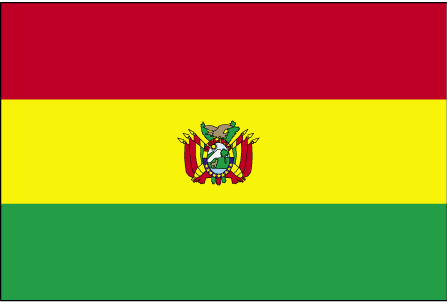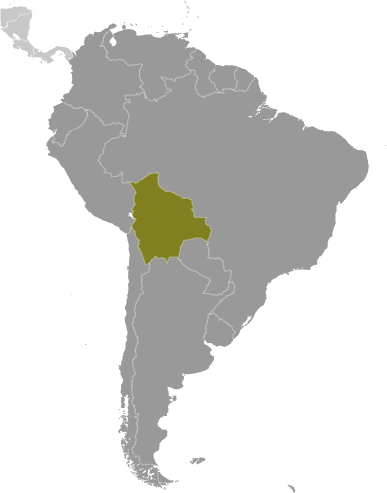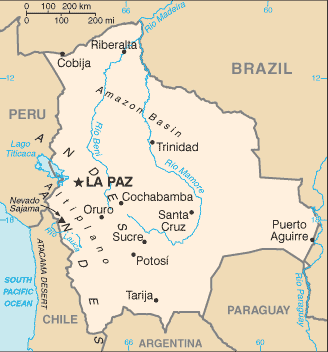Bolivia, named after independence fighter Simon BOLIVAR, broke away from Spanish rule in 1825; much of its subsequent history has consisted of a series of nearly 200 coups and countercoups. Democratic civilian rule was established in 1982, but leaders have faced difficult problems of deep-seated poverty, social unrest, and illegal drug production. In December 2005, Bolivians elected Movement Toward Socialism leader Evo MORALES president - by the widest margin of any leader since the restoration of civilian rule in 1982 - after he ran on a promise to change the country's traditional political class and empower the nation's poor, indigenous majority. However, since taking office, his controversial strategies have exacerbated racial and economic tensions between the Amerindian populations of the Andean west and the non-indigenous communities of the eastern lowlands. In December 2009, President MORALES easily won reelection, and his party took control of the legislative branch of the government, which will allow him to continue his process of change.
Country Name
Conventional long form:Plurinational State of Bolivia
Conventional short form:Bolivia
Local long form:Estado Plurinacional de Bolivia
Local short form:Bolivia
Government Type
republic; note - the new constitution defines Bolivia as a "Social Unitarian State"
Capital
Name:La Paz (administrative capital)
Geographic coordinates:16 30 S, 68 09 W
Time difference:UTC-4 (1 hour ahead of Washington, DC during Standard Time)
note: Sucre (constitutional capital)
Administrative divisions
9 departments (departamentos, singular - departamento); Beni, Chuquisaca, Cochabamba, La Paz, Oruro, Pando, Potosi, Santa Cruz, Tarija
Independence
6 August 1825 (from Spain)
National Holiday
Independence Day, 6 August (1825)
Constitution
7 February 2009
Legal system
based on Spanish law and Napoleonic Code; has not accepted compulsory ICJ jurisdiction; the 2009 Constitution incorporates indigenous community justice into Bolivia's judicial system
Suffrage
18 years of age, universal and compulsory (married); 21 years of age, universal and compulsory (single)
Executive branch
Chief of state:President Juan Evo MORALES Ayma (since 22 January 2006); Vice President Alvaro GARCIA Linera (since 22 January 2006); note - the president is both chief of state and head of government
Head of government: President Juan Evo MORALES Ayma (since 22 January 2006); Vice President Alvaro GARCIA Linera (since 22 January 2006)
Cabinet:Cabinet appointed by the president
(For more information visit the World Leaders website)
Elections:president and vice president elected on the same ticket by popular vote for a single five-year term; election last held on 6 December 2009 (next to be held in 2014); note - per the new constitution, presidents can serve for a total of two consecutive terms
Election results:Juan Evo MORALES Ayma reelected president; percent of vote - Juan Evo MORALES Ayma 64%; Manfred REYES VILLA 26%; Samuel DORIA MEDINA Arana 6%; Rene JOAQUINO 2%; other 2%
Legislative branch
bicameral Plurinational Legislative Assembly or Asamblea Legislativa Plurinacional consists of Chamber of Senators or Camara de Senadores (36 seats; members are elected by proportional representation from party lists to serve five-year terms) and Chamber of Deputies or Camara de Diputados (130 seats total; 70 uninominal deputies directly elected from a single district, 7 "special" indigenous deputies directly elected from non-contiguous indigenous districts, and 53 plurinominal deputies elected by proportional representation from party lists; all deputies serve five-year terms)
Elections:Chamber of Senators and Chamber of Deputies - last held on 6 December 2009 (next to be held in 2015)
Election results:Chamber of Senators - percent of vote by party - NA; seats by party - MAS 26, PPB-CN 10; Chamber of Deputies - percent of vote by party - NA; seats by party - MAS 89, PPB-CN 36, UN 3, AS 2
Judicial branch
Supreme Court or Corte Suprema (judges elected by popular vote from list of candidates pre-selected by Assembly for six-year terms); District Courts (one in each department); Plurinational Constitutional Court (five primary or titulares and five alternate or suplente magistrates elected by popular vote from list of candidates pre-selected by Assembly for six-year terms; to rule on constitutional issues); Plurinational Electoral Organ (seven members elected by the Assembly and the president; one member must be of indigenous origin to six-year terms); Agro-Environmental Court (judges elected by popular vote from list of candidates pre-selected by Assembly for six-year terms; to run on agro-environmental issues); provincial and local courts (to try minor cases)
Political Parties and Leaders
Bolivia-National Convergence or PPB-CN [Manfred REYES VILLA]; Movement of Social Patriotic Union or Muspa [Ana Maria FLORES Sanzetenea]; Movement Toward Socialism or MAS [Juan Evo MORALES Ayma]; National Unity or UN [Samuel DORIA MEDINA Arana]; People or Gente [Roman LOAYZA]; People for Liberty and Sovereignty or Pulso [Alejo VELIZ]; Social Alliance or AS [Rene JOAQUINO]; Social Democratic Bolivia or BSD [Rime CHOQUEHUANCA]
Political pressure groups and leaders
Bolivian Workers Central or COR; Federation of Neighborhood Councils of El Alto or FEJUVE; Landless Movement or MST; National Coordinator for Change or CONALCAM; Sole Confederation of Campesino Workers of Bolivia or CSUTCB
other: Cocalero groups; indigenous organizations (including Confederation of Indigenous Peoples of Eastern Bolivia or CIDOB and National Council of Ayullus and Markas of Quollasuyu or CONAMAQ); labor unions (including the Central Bolivian Workers' Union or COB and Cooperative Miners Federation or FENCOMIN)
International organization participation
CAN, FAO, G-77, IADB, IAEA, IBRD, ICAO, ICC, ICCt, ICRM, IDA, IFAD, IFC, IFRCS, ILO, IMF, IMO, Interpol, IOC, IOM, IPU, ISO (correspondent), ITSO, ITU, LAES, LAIA, Mercosur (associate), MIGA, MINUSTAH, MONUC, NAM, OAS, OPANAL, OPCW, PCA, RG, UN, UNASUR, UNCTAD, UNESCO, UNFICYP, UNIDO, Union Latina, UNMIL, UNMIS, UNOCI, UNWTO, UPU, WCO, WFTU, WHO, WIPO, WMO, WTO
Diplomatic representation in the US
Chief of mission:Ambassador (vacant); Charge d'Affaires Erika Angela DUENAS Loayza
Chancery:3014 Massachusetts Avenue NW, Washington, DC 20008
Telephone:[1] (202) 483-4410
FAX:[1] (202) 328-3712
Consulate(s) general: Los Angeles, Miami, New York, San Francisco
note: as of September 2008, the US has expelled the Bolivian ambassador to the US
Diplomatic representation from the US
Chief of mission:Ambassador (vacant); Charge d'Affaires John CREAMER
Embassy:Avenida Arce 2780, Casilla 425, La Paz
Mailing address:P. O. Box 425, La Paz; APO AA 34032
Telephone:[591] (2) 216-8000
FAX: [591] (2) 216-8111
note: as of September 2008, the Bolivian Government has expelled the US Ambassador to Bolivia
Flag description
three equal horizontal bands of red (top), yellow, and green with the coat of arms centered on the yellow band
note: similar to the flag of Ghana, which has a large black five-pointed star centered in the yellow band; in 2009, a presidential decree made it mandatory for a so-called wiphala - a square, multi-colored flag representing the country's indigenous peoples - to be used alongside the traditional flag










